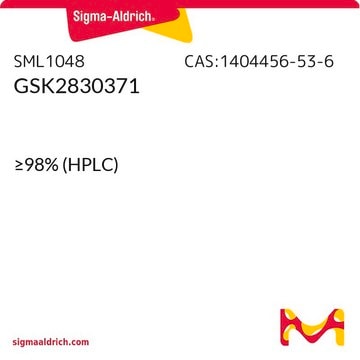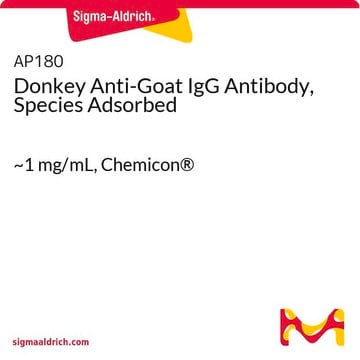A cell-permeable pyridinylaminomethylthienylcarboxamide that acts as a potent inhibitor against wild-type p53-induced phosphatase Wip1/PPM1D/PP2Cδ activity (IC
50/[wip1]/[substrate]= 6 nM/1 nM Wip1/50 µM FDP and 13 nM/15 nM Wip1/8 nM pT180 p38) via an allosteric interaction with the ′flap′ region outside the catalytic site in a reversible and substrate-noncompetitive manner, while exhibiting little potency toward yeast YopH and 22 other human phosphatases (IC
50 >30 µM), including PPM1A/PP2Cα & PPM1K/PP2Cκ. Shown to increase cellular Wip1 substrates phosphorylation, including p53 (S15), Chk2 (T68), H2AX (S139), and ATM (S1981), leading to p53 response protein p21/Waf1 upregulation and selective growth inhibition against breast cancer MCF-7 (IC
50 = 500 nM in 14-d colony formation assay) and 22 lymphoid cell lines (IC
50 from 24 nM to 2.2 µM in 7-d viability assay) expressing wt p53, but not BT474 breast cancer or a panel of 25 hematologic cancer cultures with mutant p53 status (IC
50 >10 µM). Albeit short
in vivo half-life, frequent and high daily oral dosages effectively suppress B-cell lymphoma DoHH2-derived tumor growth in mice (by 41% and 68% in 14 days with 75 mg/kg/12 h or 150 mg/kg/8 h oral dosage, respectively)
in vivo. In addition to direct inhibition against Wip1 phosphatase activity, GSK2830371 binding also results in downregulation of cellular Wip1 protein, but not mRNA, level due to ubiquitination-dependent degradation. MG-132 (Cat. Nos.
474790,
474787,
474788, and
474791) effectively prevents GSK2830371-induced Wip1 degradation without interfering with the phosphorylation enhancing effect of GSK2830371 toward Wip1 substrates.
A cell-permeable, orally available pyridinylaminomethylthienylcarboxamide compound that acts as a potent, allosteric, non-competitive, and reversible inhibitor of wild-type p53-induced phosphatase (Wip1; IC
50 = 6 nM for dephosphorylation of fluorescein diphosphate by Wip1 (2-240) and 13 nM for phospho-p38 MAP kinase (Thr180)). Does not affect the activity of 21 other phosphatases studied (IC
50 ≥ 30 µM). Binds to the flap region in close proximity to Wip1 catalytic site and impairs ubiquitin-mediated degradation of Wip1. Co-treatment of cells with MG-132 (Cat. No.
474790) reverses the reduction in Wip1 levels in cells. Enhances phosphorylation of Chk2 (Thr68), p53 (Ser15), H2AX (Ser139), and ATM (Ser1981) and upregulates the levels of p21/WAF1 in various tumor cells. Shown to block the growth of hematopoietic tumor cell lines and Wip1-amplified breast tumor cells harboring wild-type TP53, but does not affect BT474 cells carrying mutant p53 and amplified Wip1. Due to its short half life and reversible action, a sustained inhibition is warranted to block tumor growth. Reduces the growth of DOHH2 lymphoma tumor xenografts in mice (~150 mg/kg, p.o. bid or tid).
Please note that the molecular weight for this compound is batch-specific due to variable water content.








